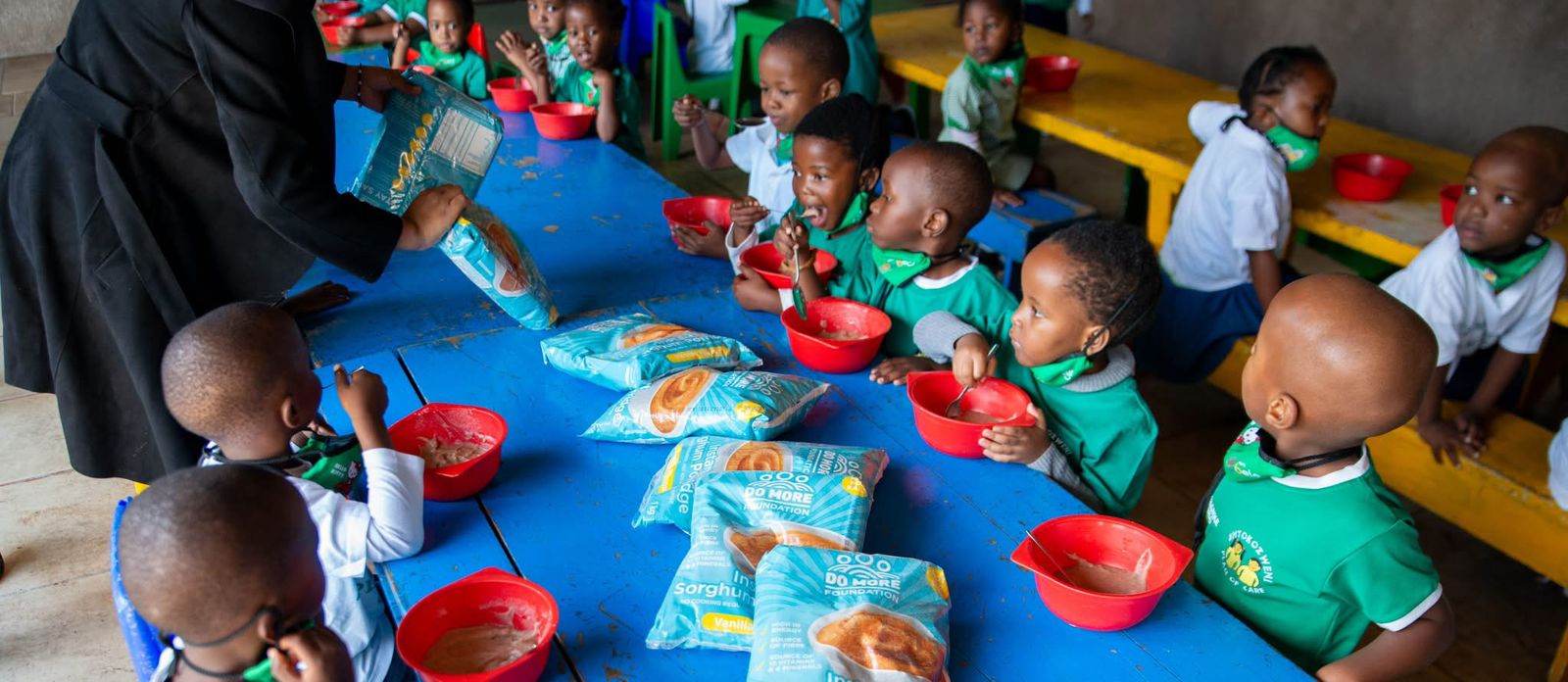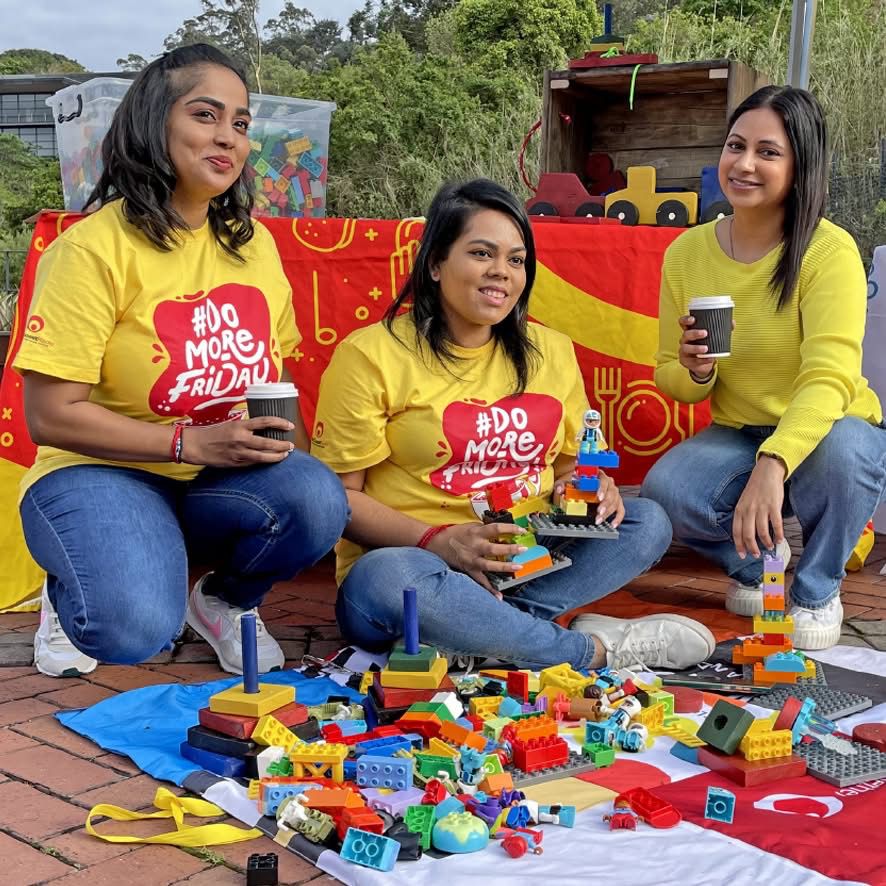Feeding as a Systems Lever: Reflections on DO MORE’s ECD Nutrition Support Programme
12 Aug 2025
The DO MORE FOUNDATION’s fortified porridge distribution model responds to the needs of local communities. While it is not a silver bullet to solve all social challenges, it represents a practical and impactful step toward improving child well-being through nutrition support.
Why feed children in ECD centres and what are we feeding?
Early childhood is a critical period for growth and brain development. Poor nutrition during this time can lead to stunting, which affects not only a child’s height but also their cognitive development, immune function, and future learning and earning potential.
In South Africa, fewer than 25% of children receive a minimum acceptable diet at home. Providing a fortified meal daily at ECD centres helps fill this gap. While it alone cannot eliminate stunting, it is a vital contribution to children’s nutritional needs, supporting their concentration and energy for learning.
Breakfast is a strategic offering, as a nutrient-rich meal at the start of the day provides children with energy for their morning activities at the ECD centres, following a night where they may not have had an adequate meal in the evening. South Africa’s National ECD Guidelines identify fortified meals as useful in settings where optimal nutrition is not a reality. In 2021, DO MORE FOUNDATION partnered with RCL FOODS to improve the nutritional quality of their sorghum porridge for donation to ECD programmes. According to the 2021 Reformulation Report, the updated recipe contains:
55% more protein to support growth,
Between 22% and over 350% more vitamins and minerals, including triple the zinc to support immunity,
77% less salt, and sugar levels aligned with guidelines for young children.
One bowl of fortified porridge daily cannot undo years of poor nutrition, but it serves as a crucial nutritional anchor in our broader efforts to keep children well-nourished and ready to learn.
.jpeg)
How Porridge Supports Community Development
Feeding young children is not an isolated intervention, DMF leverages the nutrition support intervention as a strategic entry point into communities. If porridge was the foundation, what followed is relationship building, learning together, and layered support for the beneficiaries.
Providing daily fortified meals at ECD centres creates regular touchpoints with caregivers, teachers, and parents. It also allows for support from a local Resource and Training Organisation. This contact enables DO MORE FOUNDATION to activate a broader set of integrated services aligned with South Africa’s National Integrated Early Childhood Development Policy (NIECD). These include practitioner support, nutrition education, cook training, growth monitoring, learning through play, and psychosocial support. In this way, feeding functions as a systems lever, convening diverse actors around the holistic development of young children.
Aligning with impact partners who recognise that nutrition is a priority activity when it comes to learning and child health. The DMF Porridge distribution has become an example of the social compact between corporates, nonprofits and government to do right by young children and their communities. . These partnerships enable the DO MORE FOUNDATION to integrate nutrition into early childhood development (ECD) in a way that is both practical and deeply transformative.
A key distribution partner in this effort is KFC, through its Add Hope initiative. As a national platform for collective giving, Add Hope harnesses customer contributions at tills across South Africa and channels them into localised feeding programmes. Through this partnership, the DO MORE FOUNDATION is able to reach thousands of young children each day with warm, fortified porridge as a point of care, routine, and health within the ECD environment. These partnerships reflect a shared commitment to tackling the root causes of child undernutrition, while strengthening the ecosystems that support young children where they live, learn, and grow.

2025 Milestones – DO MORE FOUNDATION Nutrition Programme
By the close of the 2025 financial year (July 2024 – June 2025), the DO MORE FOUNDATION will have made significant strides in advancing child nutrition and reducing food waste through strategic partnerships and community-rooted implementation. We have reached:
7,575,660 fortified porridge meals served
37,879 tons of porridge distributed
Support to 1,429 ECD centres across all 9 provinces
Reaching an average of 34,725 young children monthly
Feeding support aligned with the ECD calendar across approximately 200 days of the year
Redirected short-dated and surplus stock reducing food waste while strengthening food security for children. This work directly contributes to RCL FOODS’ Sustainability Strategy 2030, especially under the pillar of Nourishing People and advancing Goal 1: Greater Access to Nutrition
Growth monitoring at target sites for assess nutritional status.
With support from SA Harvest and FoodForward SA, short-dated stock has been safely and efficiently channelled into local ECD systems
Feeding Crisis Calls
In Nkomazi and Bushbuckridge, during two crisis calls during 2025, DMF partnered in a localised collaboration to enable food distribution not only within centres but directly into family homes. This is a meaningful step toward fulfilling every child’s right to adequate nutrition, as championed by movements like Real Reform for ECDs and the Right to Nutrition campaign, and through the allocation of a Nutrition pilot budget in the national treasury budget 2024.
Spotlighting World Food Day
On 20 October 2024, the DO MORE FOUNDATION marked World Food Day by rallying partners from the public, private, and non-profit sectors in a united effort to uphold every child’s right to nutritious food. In partnership with East Coast Radio, the campaign amplified awareness around childhood hunger and mobilised extraordinary generosity through t-shirt sales and donations. Together, we raised enough to provide DoMore fortified porridge enough to feed 527 young children for an entire year in ECD centres across KwaZulu-Natal. This collective effort was a powerful reminder that the spirit of ubuntu is alive and thriving in South Africa.

Emerging Insights from the National Programmes Team
Leveraging Regional Training Organisations (RTOs) to strengthen local systems: RTOs provide more than logistics; they link ECD centres to training, resources, and networks, improving the quality of early learning. Feeding is embedded within this broader ecosystem of capacity building.
Mobilising funding to enable layered interventions: DO MORE has secured co-investment to expand beyond meals, leading to the provision of nutrition education, cook training, and growth monitoring in ECD settings.
Cooking demonstration nationally aligned to nutrition week and world food day 2024 was a stand out event that took advocacy efforts of nutrition week closer to the local communities.
Using growth monitoring and attendance data as adaptive management tools: Regular tracking of attendance offers insights into feeding effectiveness and our dipstick growth monitoring enables early identification of stunting and interventions to support children.
Sustained advocacy for the right to nutrition: Scaling feeding programmes maintains nutrition as a policy priority. The new national budget for the DBE includes a nutrition pilot of R192 million, which is part of the next steps for ECD feeding at centre level.
Sustained commitment from corporate and philanthropic partners, alongside active engagement from caregivers, is critical to ensuring that adequate nutrition reaches and benefits young children.
These findings reinforce the importance of strong partnerships with regional training organisations and the need for ongoing, multi-sector collaboration that goes beyond just providing food. In 2025 we have a vision for a nutrition impact story and feedback on our growth monitoring efforts.
Thank you for our community-based distributors partners:
- ACFS
- Domino Foundation
- Penreach
- Ntataise Lowveld
- Starfish Greathearts Foundation
- Lima Rural Development (Nkomazi, BBR, Worcester, Pretoria)
- Lulamaphiko
- Masakhane Trust
- Golang Kulani
- Siyakholwa
- The Unlimited Child
- Niya Consulting
- Nu-Era
- Malimani Trust
- Kago Yabana
- ECF
- Bollieland Crèche
- Vukukhanye
Thank you to our impact investment partners: Add Hope, Investec, CHEP and Ackermans, World Food Day Supporters.
By Lungile Thabethe & Dr Jessica Ronaasen